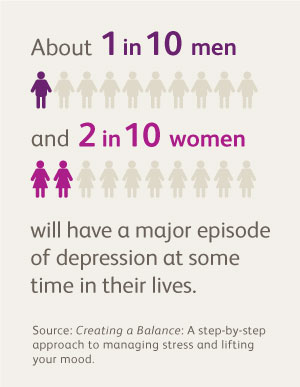How do you know when you’re depressed?

People experience depression in different ways
John, a software engineer in his 30s, recalls that his troubles started about the same time he quit playing basketball.
“I stopped returning phone calls. When friends asked me to shoot hoops after work, I’d always make up some excuse,” he says. “I just couldn’t imagine that anything would be fun.” Feeling more and more isolated and out of shape, he began to believe “things would never get better.”
We all feel down at times. However, if this feeling gets more intense or goes on for a long time, it can become depression, explains Ben Balderson, PhD, a psychologist who does research at Kaiser Permanente Washington Health Research Institute.
What's the difference between feeling down and being depressed?
Dr. Balderson explains that depression is a medical condition that not only changes the way you feel emotionally but also how you feel physically, how you think, and what you do. Depression can directly affect your body, taking away your energy, slowing you down and reducing your motivation to do activities. Symptoms can include:
- Fatigue
- Trouble sleeping
- Appetite or digestive problems
- Attention and concentration problems
Depression impacts how we feel and can go on to interfere with our life, making it hard to work, enjoy activities, and maintain relationships with friends and family.
Depression can change how we think about our health. Any pain may feel more painful. Managing other illnesses, such as arthritis or diabetes, may feel difficult and leave you feeling discouraged and hopeless. This can lead to doing less self-care, making an illness worse. It’s a cycle where each part feeds the other — the physical influences the mental, and the mental influences the physical.
Depression and emotions
Depressed feelings often go along with loss of confidence or feeling worthless. That’s how it was for Jerry, in his 50s. “I started feeling more and more down,” he remembers. After a few weeks, he was finding it increasingly difficult to concentrate on his job as a customer service rep. “Everything seemed like too much. I couldn’t take it when customers would get angry with me.”
For some people, feeling anxious or irritable and angry are big parts of depression. And sometimes these negative or painful feelings seem to come on for no reason. “I was one way or the other,” says Jerry. “Either I would feel like everything was my fault, or I’d be going off on other people about everything. I started trying to cover up how little work I was getting done. My job hadn’t really changed, but it felt unbearable. I was almost ready to quit — if they didn’t fire me first.”
Depression affects your thinking
Negative thoughts may include thoughts about yourself (taking blame for everything) or your future (feeling sure that things can’t get better). Also, negative thoughts are often extreme or exaggerated:
- “What’s the use?”
- “Bad things always happen to me.”
- “I can never do anything right.”
Every success may look small and temporary
Every mistake or disappointment may look huge and permanent. It’s as if your mental energy gets focused on judging yourself — and the judgment is always that you’re not good enough.
“I always tend to be down on myself, but it got really bad when my boss told me about a written complaint a customer made about me,” says Susie, a 39-year-old grocery clerk. “He wasn’t too critical of me. But he didn’t need to be — I really did it for him! I couldn’t stop second-guessing myself. I was thinking over and over about what I’d done wrong and remembering every mistake I’d ever made. I was so busy watching myself for mistakes that I could hardly do my job.”
Depression affects the way you act
If you’re like John — the software engineer who gave up basketball — depression makes you feel like nothing is exciting or enjoyable. You may start to avoid people or activities that used to be important to you. Unfortunately, the times you feel depressed are when you need positive people and activities the most.
It’s natural to pull back when you feel down, but this can make you feel even more depressed. It’s a “chicken or egg” situation. You feel down, so you do less. And when you start doing less, that drags you down even more.
Know the signs
It’s easy to slip into a downward spiral where depression keeps moving you further away from feeling better. But if you see the signs, you can act to break the cycle and help yourself to recover more quickly.
How do you know if you’re depressed? Dr. Balderson recommends answering these questions:
- Do you frequently feel sad or depressed?
- Do you wonder why you feel sad or discouraged — even when there’s no good reason?
- Does it seem like nothing is very interesting or enjoyable?
- When something negative happens, does your mind replay it over and over like a broken record?
- Does every criticism feel huge; every compliment feel tiny?
- Do you find yourself avoiding people or places that you used to enjoy?
- Do you find that you have no energy and everything feels like an effort?
- Has it seemed impossible to get a good night’s sleep?
Did you say “Yes” to any of these questions or do you think you may have depression?
If so, consider talking with a health care provider who can help you understand your symptoms, check if you are experiencing depression, and review treatment options that are best for you based on your symptoms.
Therapies that have helped millions of people with depression include self-care treatments, individual or group therapy, and medications. There is help. You don’t have to do this alone. You can break the cycle of depression and feel better.
Learn more
From Kaiser Permanente: Depression
- Health and Wellness: Depression
- Depression Overview
From Kaiser Permanente: Mental Health

mental health

What’s the best treatment for depression?
Whether you try antidepressants, therapy, both, or neither, KPWHRI’s Dr. Gregory Simon points to 3 ‘active ingredients’ for feeling better.
medication safety

Esketamine: How to assess new antidepressant’s efficacy
Dr. Gregory Simon says research is needed to see if this new drug for persistent depression will prevent suicides.


